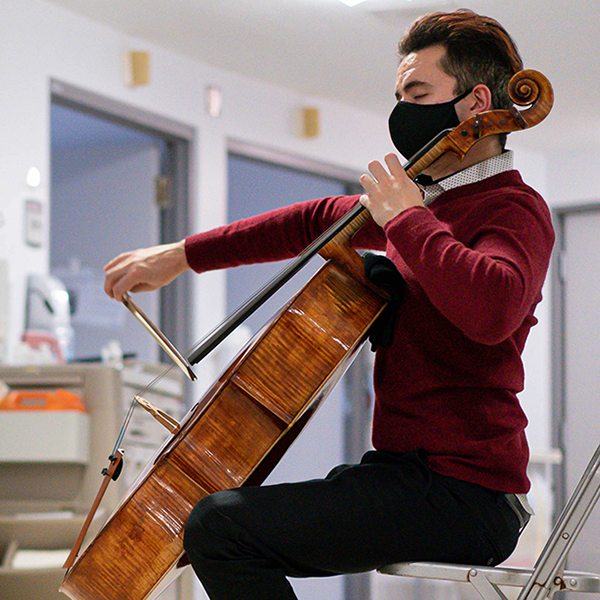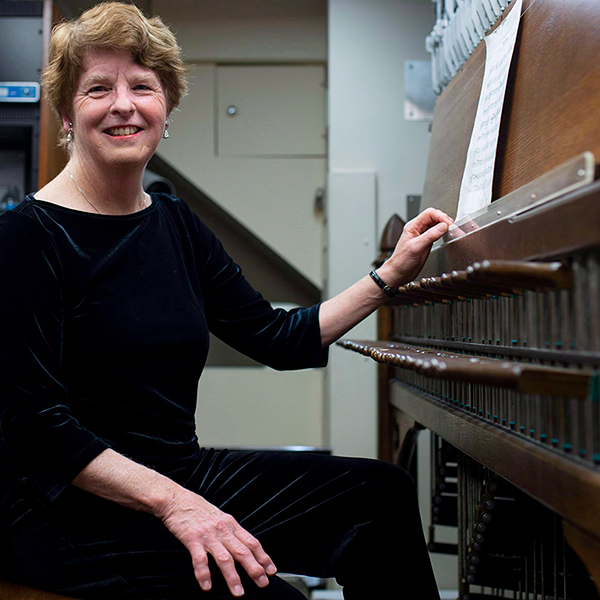Chilly Gonzales, BMus’94, the larger than life persona may have been created in Berlin (his home for many years), but Chilly Gonzales the musician was born in Montreal.
Gonzales the character can be over-the-top, flashy, and outrageous. He gets away with it because he does it all with a wink. He also gets away with it because he has the talent to back up the bluster.
The Grammy Award winner (for his contributions to Daft Punk’s Random Access Memories), hit-maker (as a co-producer, he played a vital role in the massive success of his friend Feist’s Let it Die and The Reminder) and Guinness Book of World Records holder (for a marathon solo concert that lasted more than 27 hours), is celebrated for his cerebral approach to pop. His unique musical sensibilities were influenced by his time at McGill.
As a passionate student, Jason Beck (his real name) locked horns with professors, made an unprecedented program switch, wrote musicals with his brother and covered McGill hallways with the controversial logo of his jazz band. Over the years, he had forgotten details of his time at McGill, but on a recent trip to Montreal for a photoshoot, it all came flooding back to him.
“I was benevolently kicked out of the classical performance part of my studies,” he recalls. “You have the theory part, which is blackboard stuff, then you have the performance part. I realized at one point I was falling behind in the classical performance part because my heart wasn’t in it. I wasn’t sure what to do, but I had a great teacher, the late Kenneth Woodman, who recommended I move to jazz performance but stay in classical theory.”
The school agreed, much to his surprise, and Gonzales credits that moment with having planted the seeds for his inimitable split musical personality.
“I was already trying to forge this strange fusion between classical theory, which I would attribute now to the classical colour of my music, and performing my music in this outside-in approach used by jazz musicians,” he says. “They allowed me to break the rules and gave me the special treatment I crave to this day.”
He even found a way to do his final exam differently.
“I found an obscure rule that no one was using at the time, which is for your final exam you could do a public performance and invite your professors, then they would give you feedback days later. This would have been instead of performing at the school with the panel of teachers present and giving instant feedback,” he says. “I was already in entertainer mode and was aware that an audience was an essential part of music making for me.”
He remembers that the show went well, but was told by his professor he wasn’t respectful of jazz tradition.
“Like today, my music then had a lot of pop and rap elements,” he says. “I told my teacher I didn’t really want to be a jazz musician, and that I wanted to compose my own music and perform. Jazz is a part of it, but I wanted to be a man of my time. My teacher then said, ‘Do you think the Impressionist painters would let just anyone hang out with them?’ In my mind, the answer was yes, the Impressionists were outcasts too.”
Looking back on that moment, Gonzales says he’s happy he had those disagreements with his professors.
“I don’t resent that professor and I respect purists,” he says. “We need priests of music who keep tradition alive, because otherwise the younger generations will lose those details. I also need to exist to disrespect that tradition and keep it alive in a different way.”
Not adhering to jazz purity in his exam wasn’t the only way Beck the student went against the grain at McGill: he was also in a jazz band called Don’t Believe the Hip, which featured a logo of a jazz beatnik with a red circle and line through it.
“So at that point in my life I was already referencing rap and provoking. I put posters up all over the school, so I already had that showman instinct for attention getting,” he says.
Gonzales has had a busy 2018, with tours and multiple releases (including Room 29, a collaboration with Jarvis Cocker of Pulp fame). He is also the subject of a new documentary on CBC’s In the Making. But the project that has invigorated him the most was his inaugural Gonservatory, a school of his own creation, where he invited independent artists to a residency in Paris where they learned from famous musicians and put on shows of their own.
It would be easy to view the Gonservatory as a repudiation of the formal training he received at McGill, but Gonzales says it’s more about “finding an exercise that proves to young musicians that they should let go and trust their instincts.”
As a McGill student, he wrote two musicals with his brother Christophe (now a TV and film composer with the classic series Buffy the Vampire Slayer among his credits). The first was The Nose of Polten Worth, based on Gogol’s The Nose, a short story about a nose that leaves its owner’s face and lives a life of its own. Musically, Gonzales compared it to 50 per cent Little Shop of Horrors and 50 per cent Les Misérables. They did a cast recording, but it’s unlikely to ever see the light of day.
“In my first year at McGill, I hustled to have the Players’ Theatre put it on. It went great, we had a lot of amazing press. It was really unpolished, but it had a lot of heart. We were really a ragtag group of outcasts putting on a show. The follow up was much more ambitious, a bigger affair that my brother and I put on independently, we didn’t have good source material and we over shot. I learned an important lesson about beginner’s luck and losing something quickly when you get ahead of yourself.”
The ill-fated follow-up, Rumble Town, reminded Gonzales of another McGill memory.
“We thought we were making a unified statement about creativity,” he recalls. “We were writing up until the very last second, to the point where we were communicating by fax. I had a fax machine in my Gardner Hall dorm room, and I’m pretty sure I was the only student to have a fax machine in their dorm room. I became known as the weird guy with the fax machine, with pages and pages of music coming out of it.”
Chilly Gonzales will be performing at the Maison symphonique on October 26 and 27


